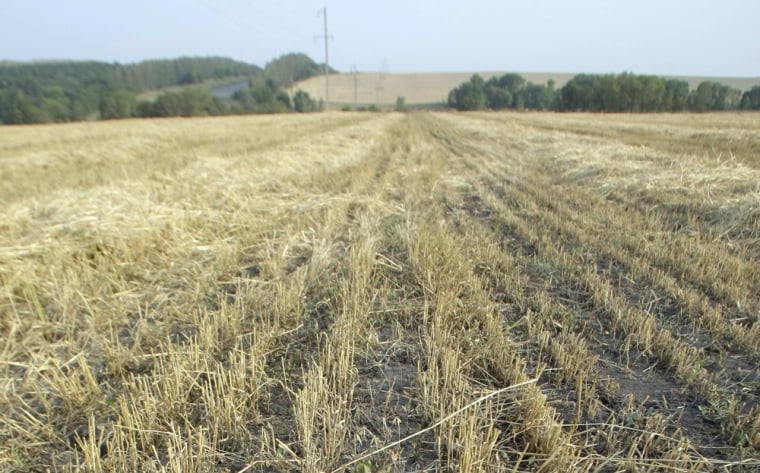Your daily bread will cost a few pennies more thanks to wildfires and drought in Russia.
Russia’s decision to ban grain exports for the remainder of the year will likely have some ripple effect on the price you pay for bread, pasta and other staples, but prices shouldn’t rise too significantly.
“There probably will be some increase in the price of bread and other wheat-based products,” said Tom Jackson, senior economist for agriculture with IHS Global Insight. “I think we’re already seeing some indication that will happen.”
Still, any increase in your favorite loaf of bread or bag of pasta is not expected to be nearly as bad as in 2008, when the price of food shot up as grain prices soared. That’s partly because the amount of wheat available is much greater than it was then, and partly because the economy is much weaker.
Russia said Thursday that it would ban wheat exports from Aug. 15 until the rest of the year after millions of acres were destroyed by the country's worst drought in 130 years and by raging wildfires prompted in part by a heat wave. The country’s government said the ban on exports was necessary to keep the price the country’s own people pay for food from rising too much.
The decision sent wheat prices soaring on Thursday, although prices fell somewhat on Friday.
Russia does play an important role in how the world gets its carbohydrates: It was the fourth largest exporter of wheat in 2009, according to Christopher Hurt, an agricultural economist at Purdue University.
Still, the U.S. is the largest wheat exporter and Hurt said the good news — for prices and for the world’s wheat eaters — is that the American farmers are expected to have a lot of wheat to sell this year.
Hurt expects annualized food inflation to be around 1 percent this year, with a rise in wheat prices playing a small part in that increase.
Jackson said one reason the price of wheat won’t affect food prices too much is because wheat is grown widely throughout the world, so a shortage in one country can generally be made up for in another. Other grains, such as corn, are grown in more concentrated areas, so one bad crop will have a bigger impact.
The economy also is considerably weaker than in 2008, when Americans were suddenly hit with higher grocery store bills.
“Particularly earlier in 2008, you just felt like you could put whatever price you wanted on (food) and you really weren’t worried about a kickback from consumers, but you just can’t have that confidence right now,” Jackson said.
He said that food producers can only absorb so much of an increase before they have to start thinking about passing costs on to the customer.
“A question that bread makers and folks are going to have to ask is, ‘How much can you get away with?'” Jackson said.
Worried about your grocery bill? Take a break and follow me on Twitter @alinnmsnbc
